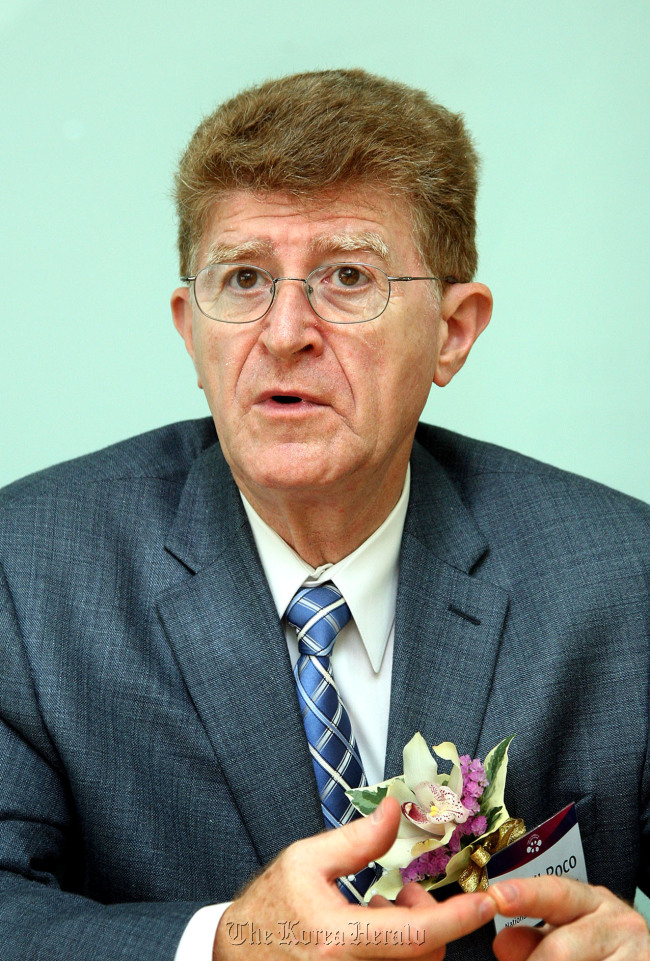A top U.S. nanotechnology expert called for greater collaboration among countries and disciplines to deliver its potential to revolutionize computing, electronics, medicine, energy, environment and even agriculture.
Nanotechnology is a fast-developing field of engineering that deals with manipulating materials of atomic and molecular size. One nanometer is one-billionth of a meter.
The technology is finding its way into an increasingly wider range of industries with the convergence of diverse fields accelerating the pace, according to Mihail Roco, a senior advisor at the National Science Foundation of the U.S. and founding chair of the U.S. National Nanotechnology Initiative established in 1999.
International collaboration is key to its development that requires a combination of various scientific and technological breakthroughs, he said in an interview with The Korea Herald.
“International collaboration in nanoscale science and engineering is essential at this moment because the field is growing rapidly with different focuses and multidisciplinary breakthroughs in different countries, and the synergism of such contributions determines faster and more efficient development,” he said.
Nanotechnology is a fast-developing field of engineering that deals with manipulating materials of atomic and molecular size. One nanometer is one-billionth of a meter.
The technology is finding its way into an increasingly wider range of industries with the convergence of diverse fields accelerating the pace, according to Mihail Roco, a senior advisor at the National Science Foundation of the U.S. and founding chair of the U.S. National Nanotechnology Initiative established in 1999.
International collaboration is key to its development that requires a combination of various scientific and technological breakthroughs, he said in an interview with The Korea Herald.
“International collaboration in nanoscale science and engineering is essential at this moment because the field is growing rapidly with different focuses and multidisciplinary breakthroughs in different countries, and the synergism of such contributions determines faster and more efficient development,” he said.

Roco, editor-in-chief of the journal of Nanoparticle Research, came to Korea to attend the 9th Korea-U.S. Nano Forum held at Hanyang University in Seoul this week. The annual conference is co-organized by the Ministry of Education, Science and Technology and the U.S. National Science Foundation.
“Twenty years ago only professors are interested in nanotechnology, but now the chiefs of state, governments and the media are all speaking of nano ― because this technology has become closer to reality,” Roco said.
“Because it is important, we should not close the door, and be open and creative to use this opportunity for the future development,” he added.
The technology is now moving out of the first phase of nanoscale components and into the next phase: Building a platform for technology integration.
For example, Roco pointed out that nanotechnology has provided solutions for about half of the new projects on energy conversion and storage conducted in the past decade.
In the coming years, he said, nanotechnology is set to play a pivotal role in various fields, such as medicine, molecular biology and energy production.
“By working in nanometer scale we can find solutions that were not possible before. For instance, we can improve the early detection of cancer by using nanotechnology,” he said
“Nanotechnology makes things more economic, and I believe it is by far the best technology for sustainable development.”
He noted that the nanotechnology market is already rapidly emerging. In a prediction in 2005, Roco said that the market for nanotechnology-enabled products would reach $1 trillion by 2015.
“Now we are exactly on target,” he said.
According to him, the market has already reached about $300 billion with an annual growth rate of 25 percent per year in 2010-2011.
Many countries, including Korea, are competing to develop their national nanotechnology capabilities to foster a future engine of economic growth.
The U.S. alone has invested some $12 billion in nanotechnology research and development over the past decade through the nanotech initiative, and its annual budget already surpassed $1.8 billion in 2011, he said.
But right now, countries should focus more on collaboration than competition, he claimed.
“We have to collaborate to find mutual interests and build research infrastructures, and basic research needs to be done in order to move to applications, “he said.
He noted that the U.S. and Korean researchers have developed relatively strong collaboration through their annual Korea-U.S Nano Forum.
Since its establishment in 2003, the forum has provided a great opportunity for encouraging collaboration among researchers, and has already led to partnerships, in particular, in energy production, such as solar energy and water refinery systems, he noted.
In another example, he said, the Network for Computational Nanotechnology at Purdue University in the United States has about 3,000 users in nanoscale modeling and simulation from Korea.
By Oh Kyu-wook (596story@heraldcorp.com)
-
Articles by Korea Herald








![[KH Explains] Hyundai's full hybrid edge to pay off amid slow transition to pure EVs](http://res.heraldm.com/phpwas/restmb_idxmake.php?idx=644&simg=/content/image/2024/04/18/20240418050645_0.jpg&u=20240419100350)







![[From the Scene] Monks, Buddhists hail return of remains of Buddhas](http://res.heraldm.com/phpwas/restmb_idxmake.php?idx=652&simg=/content/image/2024/04/19/20240419050617_0.jpg&u=20240419175937)

![[KH Explains] Hyundai's full hybrid edge to pay off amid slow transition to pure EVs](http://res.heraldm.com/phpwas/restmb_idxmake.php?idx=652&simg=/content/image/2024/04/18/20240418050645_0.jpg&u=20240419100350)

![[Today’s K-pop] Illit drops debut single remix](http://res.heraldm.com/phpwas/restmb_idxmake.php?idx=642&simg=/content/image/2024/04/19/20240419050612_0.jpg&u=)